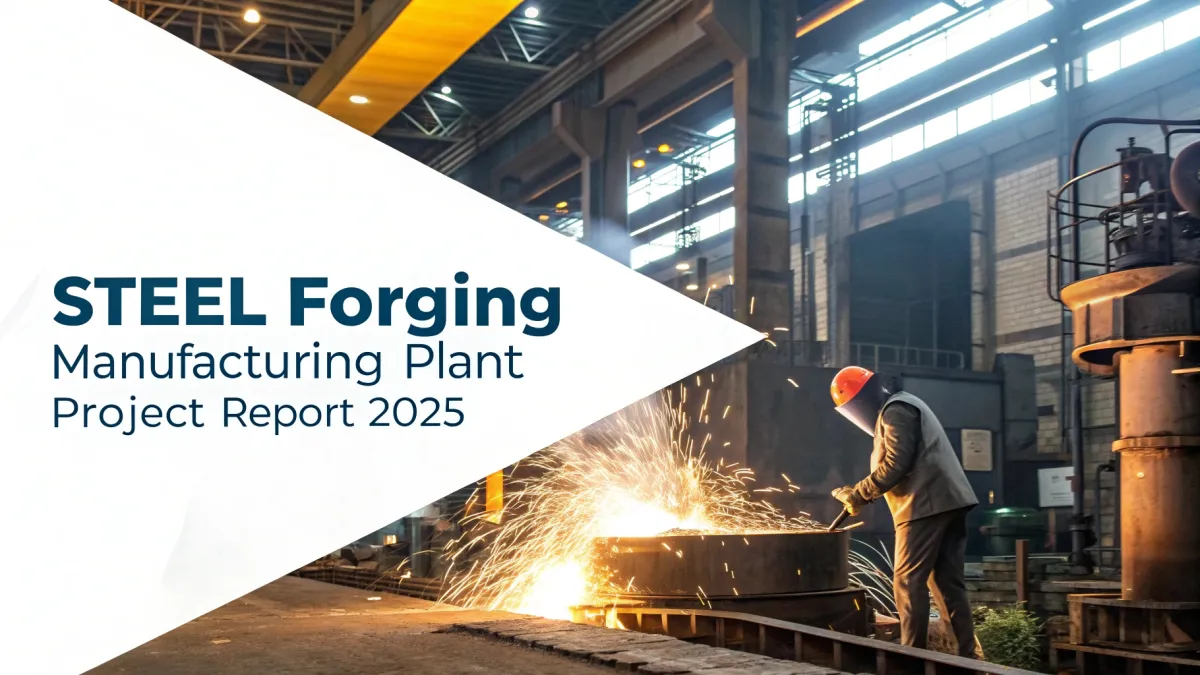
Steel Forging Manufacturing Plant Project Report 2025 Setup Cost, Machinery And Raw Materials
Setting up a steel forging manufacturing plant requires industrial furnaces, forging presses, heat treatment facilities, machining equipment, material handling systems, and quality control laboratories. Key considerations include proximity to steel suppliers, skilled workforce availability, compliance with safety and environmental regulations, and efficient supply chain management for both raw materials and finished products.
IMARC Group's report, titled “Steel Forging Manufacturing Plant Project Report 2025: Industry Trends, Plant Setup, Machinery, Raw Materials, Investment Opportunities, Cost and Revenue,” provides a complete roadmap for setting up a steel forging manufacturing plant. It covers a comprehensive market overview to micro-level information such as unit operations involved, raw material requirements, utility requirements, infrastructure requirements, machinery and technology requirements, manpower requirements, packaging requirements, transportation requirements, etc.
Request for a Sample Report : https://www.imarcgroup.com/steel-forging-manufacturing-plant-project-report/requestsample
Steel Forging Industry Outlook 2025:
The steel forging industry outlook for 2025 shows robust growth prospects, driven by increasing demand from automotive lightweighting initiatives, aerospace expansion, and renewable energy infrastructure development. Rising emphasis on component reliability and performance in critical applications is boosting forged steel adoption over alternatives. Government infrastructure spending and industrial modernization programs are creating substantial market opportunities. Technological advancements in precision forging, automation, and heat treatment processes are improving production efficiency and product quality. Although challenges such as raw material price volatility and energy costs persist, the steel forging industry is positioned for steady expansion, supported by global industrialization and the growing need for high-performance metal components in 2025.
Key Insights for Steel Forging Manufacturing Plant Setup:
Detailed Process Flow:
-
Product Overview
Unit Operations Involved
Mass Balance and Raw Material Requirements
Quality Assurance Criteria
Technical Tests
Project Details, Requirements and Costs Involved:
-
Land, Location and Site Development
Plant Layout
Machinery Requirements and Costs
Raw Material Requirements and Costs
Packaging Requirements and Costs
Transportation Requirements and Costs
Utility Requirements and Costs
Human Resource Requirements and Costs
Capital Expenditure (CapEx) and Operational Expenditure (OpEx) Analysis:
Project Economics:
-
Capital Investments
Operating Costs
Expenditure Projections
Revenue Projections
Taxation and Depreciation
Profit Projections
Financial Analysis
Profitability Analysis:
-
Total Income
Total Expenditure
Gross Profit
Gross Margin
Net Profit
Net Margin
Request for Customized Report: https://www.imarcgroup.com/request?type=report&id=8749&flag=E
Key Cost Components of Setting Up a Steel Forging Manufacturing Plant
-
Land & Infrastructure - Industrial space for forging operations, heat treatment facilities, machining areas, and finished goods storage
Raw Material Procurement - Steel billets, bars, ingots, and alloy materials with reliable supply chain partnerships
Machinery & Equipment - Forging presses, drop hammers, induction furnaces, heat treatment equipment, machining centers, and material handling systems
Labor & Workforce - Skilled operators, metallurgists, quality inspectors, maintenance technicians, and production supervisors
Energy & Utilities - High-capacity electrical supply, natural gas, compressed air, cooling water, and backup power systems
Quality Control & Testing - Metallurgical laboratories, non-destructive testing equipment, dimensional inspection tools, and certification facilities
Packaging & Logistics - Protective packaging materials, specialized handling equipment, and transportation arrangements for heavy components
Regulatory Compliance - Safety certifications, environmental permits, industrial licensing, and quality management system implementations
Economic Trends Influencing Steel Forging Manufacturing Plant Setup Costs 2025
-
Automotive Industry Evolution - Growing demand for lightweight, high-strength forged components in electric and hybrid vehicles
Infrastructure Development - Government investments in transportation, energy, and industrial infrastructure projects
Aerospace Sector Growth - Expanding commercial aviation and defense spending driving precision forging demand
Energy Transition - Renewable energy projects requiring specialized forged components for wind turbines and hydroelectric systems
Industrial Automation - Adoption of smart manufacturing technologies and robotics in forging operations
Supply Chain Resilience - Focus on domestic manufacturing capabilities and reduced import dependence
Challenges and Considerations for Investors in Steel Forging Manufacturing Plant Projects:
-
High Capital Investment - Substantial upfront costs for specialized forging equipment and facility infrastructure
Technical Expertise Requirements - Need for skilled metallurgists, process engineers, and experienced forging operators
Raw Material Price Volatility - Steel price fluctuations impacting production costs and profit margins
Energy Intensity - High electricity and fuel consumption affecting operational expenses
Quality Standards Compliance - Stringent industry specifications and certification requirements for critical applications
Competition Intensity - Established players with long-term customer relationships and proven track records
Environmental Regulations - Compliance with emissions standards, waste management, and workplace safety requirements
Conclusion:
The steel forging industry in 2025 presents compelling investment opportunities driven by robust demand across multiple end-use sectors and technological advancement trends. Establishing a steel forging manufacturing plant offers strong revenue potential but requires comprehensive planning around equipment selection, process optimization, and quality assurance systems. While challenges such as high capital requirements, technical complexity, and competitive pressures exist, supportive industrial policies and growing infrastructure investments are creating favorable market conditions.
Investors who focus on advanced forging technologies, develop specialized product capabilities, and build strong customer partnerships will be well-positioned to capture market share in the expanding steel forging industry worldwide.
About Us:
IMARC Group is a global management consulting firm that helps the world's most ambitious changemakers to create a lasting impact. The company excel in understanding its client's business priorities and delivering tailored solutions that drive meaningful outcomes. We provide a comprehensive suite of market entry and expansion services. Our offerings include thorough market assessment, feasibility studies, company incorporation assistance, factory setup support, regulatory approvals and licensing navigation, branding, marketing and sales strategies, competitive landscape, and benchmarking analyses, pricing and cost research, and procurement research.
Contact Us:
IMARC Group
134 N 4th St. Brooklyn, NY 11249, USA
Email: sales[@]imarcgroup.com
Tel No:(D) +91 120 433 0800
United States: (+1-201971-6302)
Legal Disclaimer:
MENAFN provides the
information “as is” without warranty of any kind. We do not accept
any responsibility or liability for the accuracy, content, images,
videos, licenses, completeness, legality, or reliability of the information
contained in this article. If you have any complaints or copyright
issues related to this article, kindly contact the provider above.

















Comments
No comment